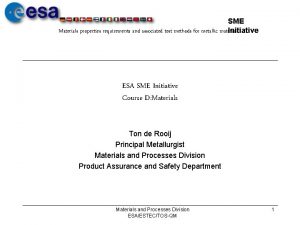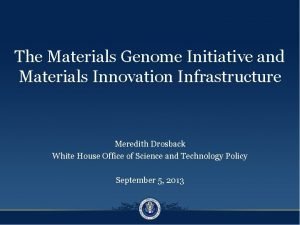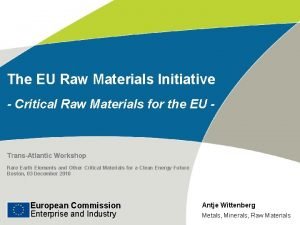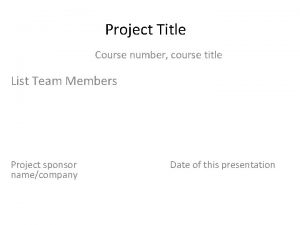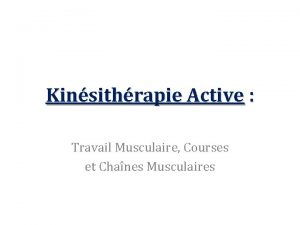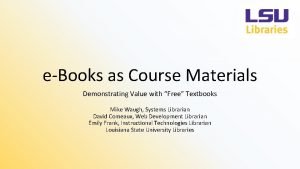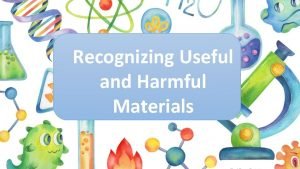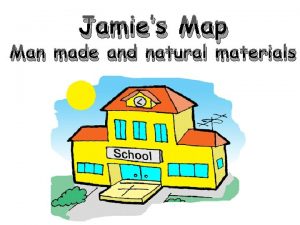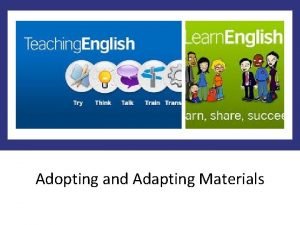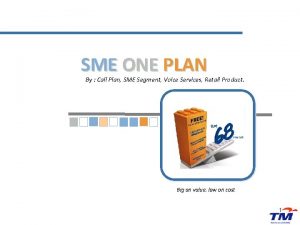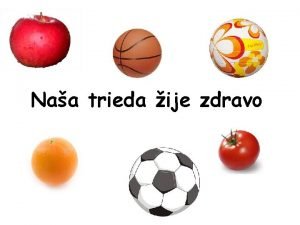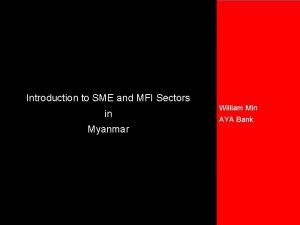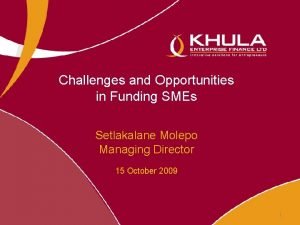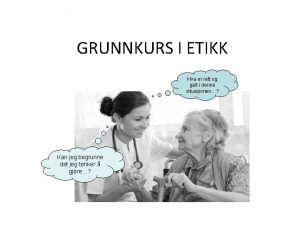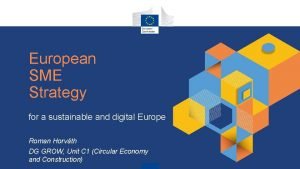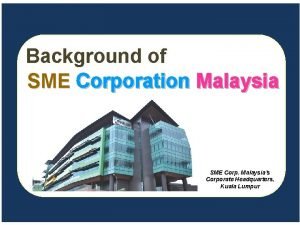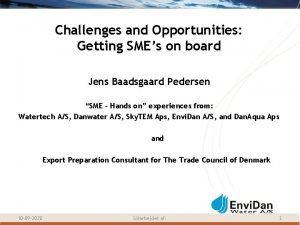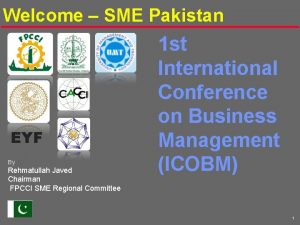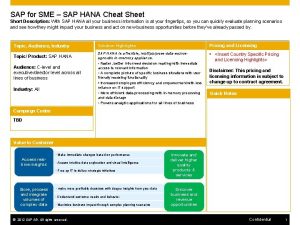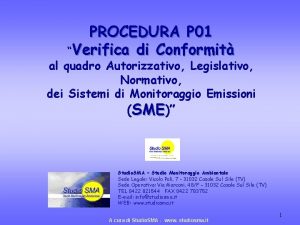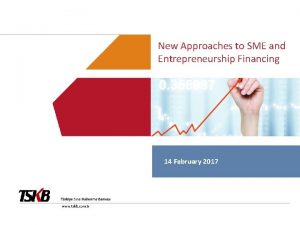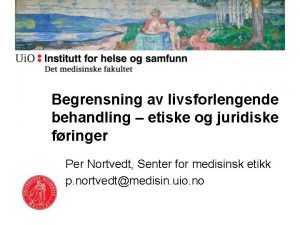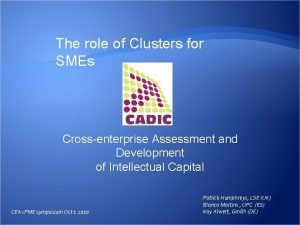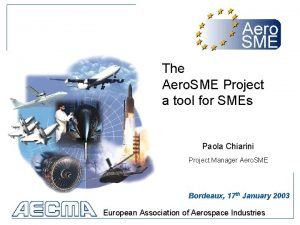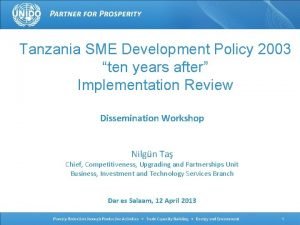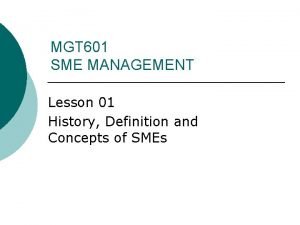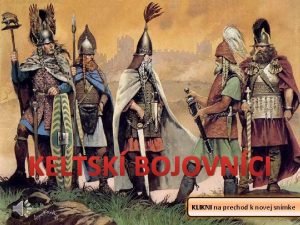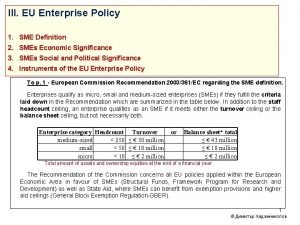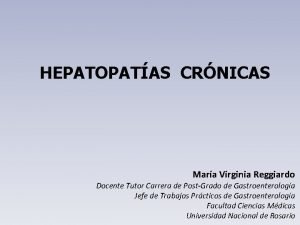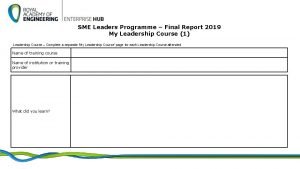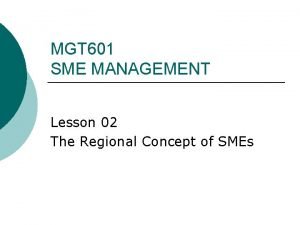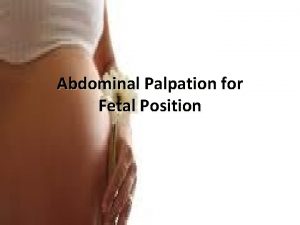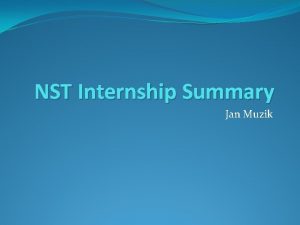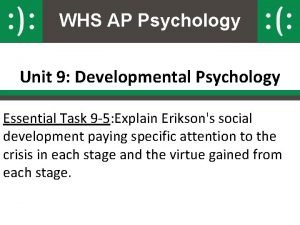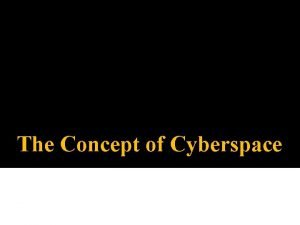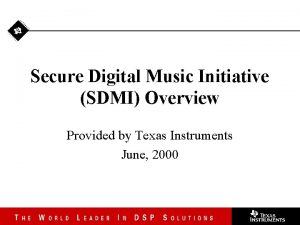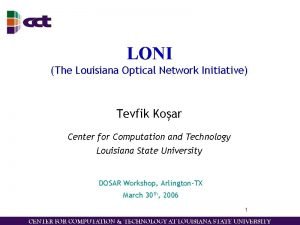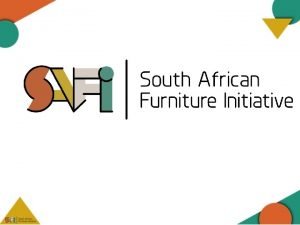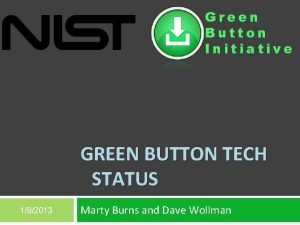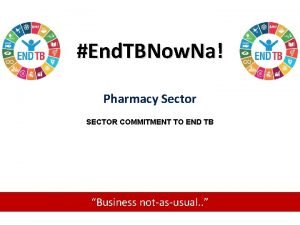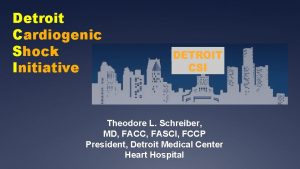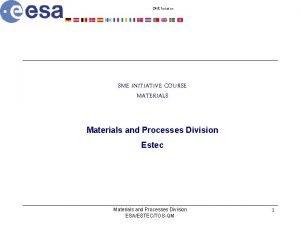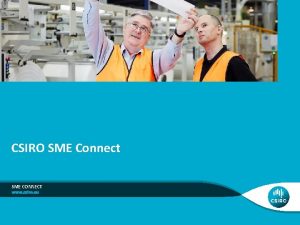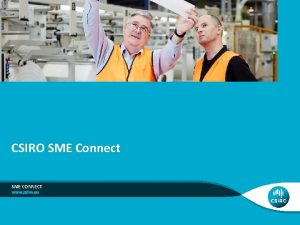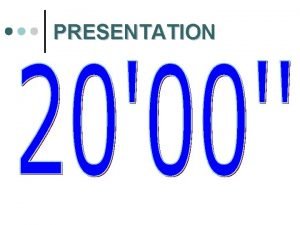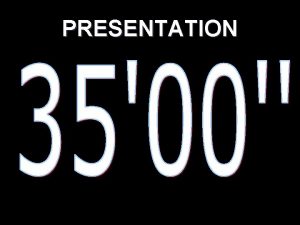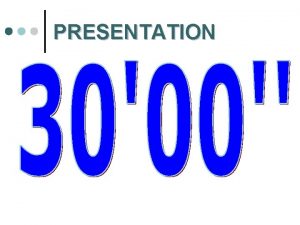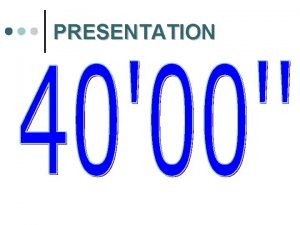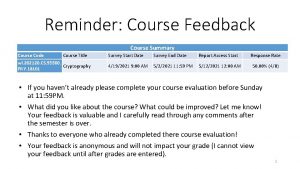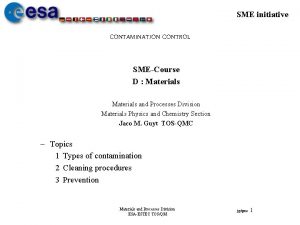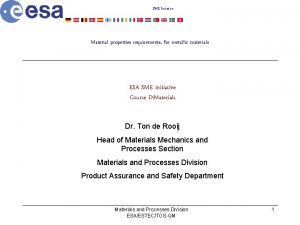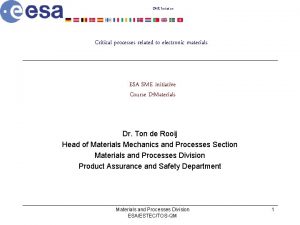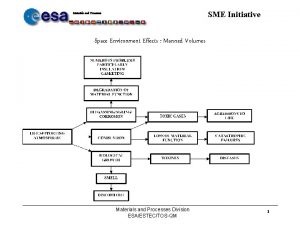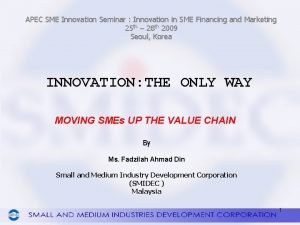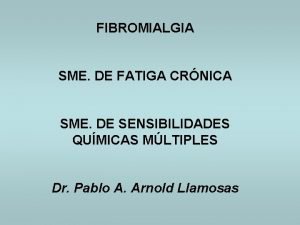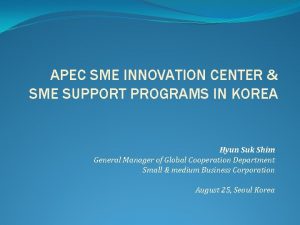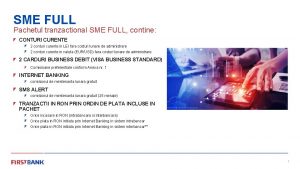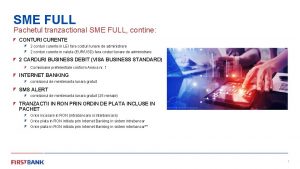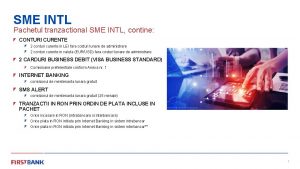SME Initiative SME INITIATIVE COURSE MATERIALS SUMMARY PRESENTATION

























































- Slides: 57

SME Initiative SME INITIATIVE COURSE MATERIALS SUMMARY PRESENTATION Dr. Ton de Rooij Head of Materials Mechanics and Processes Section Materials and Processes Division Product Assurance and Safety Department Materials and Processes Division ESA/ESTEC/TOS-QM 1

SME Initiative The following section presents the requirements for PMP. However the actual requirements for a particular project depend on several factors, e. g. 1. 2. 3. 4. Type of spacecraft (manned or unmanned) Spacecraft orbit (LEO, GEO, polar, etc) Complexity (satellite, payload, etc. ) Duration of space exposure (x years, y days, etc. ) The requirements will therefore be specified as part of the contract either in the statement of work or in the PA plan Materials and Processes Division ESA/ESTEC/TOS-QM 2

SME Initiative THE REQUIREMENTS RELATED TO MATERIALS, MECHANICAL PARTS AND PROCESSES Materials and Processes Division ESA/ESTEC/TOS-QM 3

SME Initiative PSS Specifications Related to PMP q PSS‑ 01‑ 70 ‑ Issue 4 ‑ Jan 94. Material, mechanical‑part and process selection and quality control for ESA space systems and associated equipment. q This specification establishes the detailed requirements for the selection and control of materials, mechanical parts and processes for space systems and associated equipment in which the use of materials etc. with specific reliability and quality requirements is mandatory. q PSS‑ 01‑ 700‑ Issue 2 ‑ Aug 93. The technical reporting and approval procedures for materials mechanical parts and processes. q This specification provides details concerning the documentation requirements and the procedure relevant to obtaining ESA approval for the use of PMP in the fabrication of space systems associated equipment. Materials and Processes Division ESA/ESTEC/TOS-QM 4

SME Initiative ECCS Specification Related to PMP q ECSS‑Q‑ 70 A‑April 96 Space Product Assurance ‑ Materials, Mechanical Parts and Processes. q The purpose of this standard is to define the requirements and statements applicable to Materials, Mechanical Parts and Processes to satisfy the mission performance requirements. This standard also provides details concerning the documentation requirements and the procedures relevant to obtaining approval for the use of PMP in the fabrication of Space Systems and associated equipment. q This documentation is currently under revision and issue B will include the documentation Requirements presently given in PSS‑ 01 ‑ 700. q In addition many of the lower level PSS Specification (PSS‑ 01‑ 7 XX series) are being Replaced by ECCS Specification (ECSS‑Q‑ 70‑XX series). Materials and Processes Division ESA/ESTEC/TOS-QM 5

SME Initiative European Co‑operation for Space Standardisation (ECSS) 1. For materials and processes the situation is presently as follows: 1. ESA PSS‑ 01 ‑ 70 has been replaced by ECSS Specification ECCS‑Q‑ 70 A 2. An additional twenty specifications, based on the PSS‑ 01 ‑ 7 xx Series, have been issued a ECSS Specifications • ECSS‑Q‑ 70‑ 02 A Thermal vacuum outgassing test for the screening of space materials • ECSS‑Q‑ 70‑ 04 A Thermal Cycling test for the Screening of space materials and processes • ECSS‑Q‑ 70‑ 07 A Automatic machine wave soldering • ECSS‑Q‑ 70‑ 08 A The manual soldering of high reliability electrical connections • ECSS‑Q‑ 70‑ 10 A Qualification of printed circuit boards • ECSS‑Q‑ 70‑ 11 A Procurement of printed circuit boards • ECSS‑Q‑ 70‑ 13 A The Peel and Pull Off Strength of Adhesives • ECSS‑Q‑ 70‑ 18 A Preparation, assembly and mounting of RF coaxial cables • ECSS‑Q‑ 70‑ 20 A Determination of the susceptibility of silver-plated copper wire and cable to plague corrosion • ECSS‑Q‑ 70‑ 21 A Flammability testing for the screening of space materials • ECSS‑Q‑ 70‑ 22 A The control of limited shelf-life materials • ECSS‑Q‑ 70‑ 25 A The Application of Aeroglaze 2306 • ECSS‑Q‑ 70‑ 26 A Crimping of high-reliability electrical Materials and Processes Division connections 6 ESA/ESTEC/TOS-QM

SME Initiative European Co‑operation for Space Standardisation (ECSS) 2. • • ECSS‑Q‑ 70‑ 28 A Repair and modification of PCB assemblies ECSS‑Q‑ 70‑ 29 A Offgassing Testing of Materials ECSS‑Q‑ 70‑ 30 A Wire‑wrapping of high reliability electrical connections ECSS‑Q‑ 70‑ 33 A The Application of Thermal Coating PSG 120 FD ECSS‑Q‑ 70‑ 34 A The Application of Aeroglaze H 322 ECSS‑Q‑ 70‑ 35 A The Application of Aeroglaze L 300 ECSS‑Q‑ 70‑ 36 A Materials selection for controlling stress corrosion ECSS‑Q‑ 70‑ 37 A Test method for stress corrosion cracking 3. An additional nine specifications are in various stages of ECSS review. • ECSS‑Q‑ 70 B Materials, mechanical parts and processes • ECSS‑Q‑ 70‑ 01 Contamination and cleanliness control • ECSS‑Q‑ 70‑ 05 Detection of organic contamination of surfaces by IR spectroscopy • ECSS‑Q‑ 70‑ 09 Measurement of thermo-optical properties of thermal control materials • ECSS‑Q‑ 70‑ 38 High reliability soldering for surface mount and mixed technology PCBs • ECSS‑Q‑ 70‑ 46 General requirements for procurement of threaded fasteners • ECSS‑Q‑ 70‑ 50 Particulate contamination control in clean rooms by particulate fall-out (PFO)measurements Division 7 • ECSS‑Q‑ 70‑ 71 Data for Materials selectionand of Processes space materials ESA/ESTEC/TOS-QM

SME Initiative THE REQUIREMENTS 1. GENERAL The Contractor shall establish and implement throughout the duration of the contract a PMP programme which ensures full compliance to PSS‑ 01‑ 70/ ECSS‑Q‑ 70. 2. PLANNING AND DOCUMENTATION The Contractor shall ensure that the PMP programme is thoroughly planned and documented. Particular emphasis shall be placed on Critical PMP. 3. PROGRAMME PLAN The Contractor shall prepare a PMP Selection and Control Plan which describes the programme and procedures he will adopt for compliance with the requirements of PSS‑ 01 ‑ 70/ ECSS‑Q‑ 70. It shall be the Contractor's responsibility to ensure that all sub‑contractors Materials and Processes 8 PMP programmes are. Division consistent with his Plan. Particular ESA/ESTEC/TOS-QM attention shall be paid to

SME Initiative THE REQUIREMENTS ‑ Continued 4. CLEANLINESS/CONTAMINATION CONTROL The Contractor shall establish and maintain an effective contamination and cleanliness-control programme in compliance with Project requirements according to PSS‑ 01‑ 201 (to be superceded by ECSS‑Q‑ 70‑ 01). q Cleanliness‑requirement specification (chemical and particle); q Cleanliness‑control plan; q Cleanliness‑monitoring procedures/methods. Materials and Processes Division ESA/ESTEC/TOS-QM 9

SME Initiative THE REQUIREMENTS (2) PMP which cannot be considered either space proven or standard/established shall be subjected to an evaluation programme in order to assess their suitability for the intended application. This programme and subsequently its result shall be submitted to ESA. 1. Thermal Vacuum Products considered for use in space systems shall have their outgassing properties assessed by thermal vacuum tests according to ECSS‑Q‑ 70‑ 02. Thermal Cycling Products which are likely to be subjected to thermal stresses shall have their thermal cycling properties assessed as per ECSS‑Q‑ 70‑ 04. Materials and Processes Division ESA/ESTEC/TOS-QM 10

SME Initiative THE REQUIREMENTS (2) 3. Radiation Products which will be exposed to particle/UV radiation shall be assessed to determine their ability to withstand the type and degree of radiation dosage expected during the mission. Tests are specified in PSS‑ 01‑ 706. 4. Stress Corrosion Products intended for structural applications and likely to be exposed to long term terrestrial storage, or flown on the STS, or used in launchers shall possess a high resistance to SCC. Structural products of a metallic nature shall be selected from the preferred list in Table 1 of ECSS‑Q‑ 70‑ 36. Where no data exists Materials and Processes Division testing shall be performed as per ECCS‑Q‑ 70‑ 37. ESA/ESTEC/TOS-QM 11

SME Initiative THE REQUIREMENTS (3) 5. Flammability Products considered for use in unmanned spacecraft to be launched by the STS and manned spacecraft (including those of the spacecraft itself, stored equipment or payload/experiments) shall be evaluated for flammability resistance in the most hazardous environment Flammability testing is described in ECSS-Q-70 -21. 6. Offgassing and Toxic analysis All products considered for use in the crew compartment of manned spacecraft shall be evaluated for offgassing and odour. Samples of each product shall be tested according to ECSS‑Q‑ 70‑ 29. Materials and Processes Division ESA/ESTEC/TOS-QM 12

SME Initiative THE REQUIREMENTS (3) 7. Atomic Oxygen All products considered for use on the external surface of spacecraft intended for low‑orbit operations shall be evaluated for their resistance to atomic oxygen erosion. Proposed tests shall be subject to ESA approval. 8. Supplementary tests The Contractor shall review his PMP programme for particular Project requirements and add any other test as relevant. These tests are subject to ESA approval. Materials and Processes Division ESA/ESTEC/TOS-QM 13

SME Initiative MATERIAL/MECHANICAL PART ENGINEERING 1. SELECTION The Contractor shall be responsible for the selection and for demonstrating that they are capable of meeting the operating, environmental, physical, chemical, safety, quality and reliability conditions defined in the relevant specifications and in the contract. 2. SELECTION OF SPACE‑PROVEN MATERIALS Well known materials/mechanical parts for which test data applicable to the space environment are available or which have been previously used in space, or similar, applications shall be selected wherever possible. However each material/mechanical part and its applications for a given Project shall be considered separately. 3. SELECTION OF OTHER MATERIALS Request for approval (RFAs) of material/mechanical parts which do Materials Processes Division 14 not meet the requirements of 2) and above shall be submitted to ESA. The ESA/ESTEC/TOS-QM format and content of the RFA is given in PSS‑ 01

SME Initiative MATERIAL/MECHANICAL PART ENGINEERING (2) 4. DECLARED MATERIAL LIST (DML)/DECLARED MECHANICAL PARTS LISTS (DMPL) The Contractor shall establish a consolidated DML and DMPL of all items used in the system. Notes: but to compile an Lists per Configuration item. a separate DMPL. In this case items are added to the DML; The project may decide not to consolidate the lists assembly of The Project may decide not to require the The format and content of the DML/DMPL is given in PSS‑ 01‑ 700 (ECSS-Q-70 B). This can be modified by a Project (subject to approval) if the specific requirements of the Project make this necessary. Amendments to the DML/DMPL shall only be implemented through established change procedures. Materials and Processes Division ESA/ESTEC/TOS-QM 15

SME Initiative MATERIAL/MECHANICAL PART ENGINEERING (3) 5. SPECIFICATIONS/STANDARDS Each type of material/mechanical part used by the Contractor and listed in the DML/DMPL shall be covered by a specification or standard. 6. NON‑CONFORMANCES Non‑conforming materials/mechanical parts found during incoming inspections, assembly or test shall be dispositioned in accordance with ECSS‑Q‑ 20. Materials and Processes Division ESA/ESTEC/TOS-QM 16

SME Initiative PROCESS ENGINEERING 1. SELECTION The Contractor shall be responsible for the selection of processes and for demonstrating that they are capable of meeting the requirements as defined in the applicable Specifications and in the contract. The Contractor and sub‑contractor shall plan and enforce an effective process control programme. ESA reserves the right to audit critical processing lines. 2. STANDARD/ESTABLISHED PROCESSES Standard processes shall be selected whatever possible. Critical processes, unless performed in accordance with PSS‑ 01 ‑ 7 XX/ECSS‑Q 70‑XX series documents shall require further identification and approval before use. Materials and Processes Division ESA/ESTEC/TOS-QM 17

SME Initiative PROCESS ENGINEERING (2) 3. NONASSESSED PROCESSES RFAs for processes for which there is no known previous history shall be fully justified and be subjected to an evaluation programme. The process identification and approval documents, defined in PSS‑ 01 ‑ 700, shall be submitted to ESA. 4. DECLARED PROCESSES LIST (DPL) The Contractor shall establish a DPL of all processes used in the programme. The format and content of such a DPL is given in PSS‑ 01 700. Amendments to the DPL shall be implemented only through established change procedure. Materials and Processes Division ESA/ESTEC/TOS-QM 18

SME Initiative PROCESS ENGINEERING (3) 5. PROCESS SPECIFICATION/STANDARD Each process shall be covered by a process specification or standard. Maximum use shall be made of existing ESA Specifications/standards and ESA approved Specifications/standards produced by international organisations and nations agencies. 6. PROCESS WORKMANSHIP STANDARDS The Contractor shall provide detailed workmanship standards for processes to aid operators and inspectors in the establishment of accept/reject criteria. Materials and Processes Division ESA/ESTEC/TOS-QM 19

SME Initiative PROCESS ENGINEERING (4) 7. CRITICAL PROCESSES Critical Processes shall be subject to stringent controls in form of documentation, QA supervision (MIP, KIPs etc). and final inspection/test. Critical processes shall be defined by the Contractor in the early phase of the contract. 8. NON CONFORMANCES Any unsatisfactory performance or non conformance which is observed shall be dispositioned in accordance with ECSS‑Q‑ 20. 9. TRAINING The Contractors shall establish a training programme for all critical process operators and inspectors PSS‑ 01‑ 748). Materials and(e. g. Processes Division ESA/ESTEC/TOS-QM 20

SME Initiative THE DOCUMENTATION REQUIREMENTS Materials and Processes Division ESA/ESTEC/TOS-QM 21

SME Initiative CONTENTS OF THE DECLARED MATERIALS LIST Materials are classified into 20 groups depending on their type or their main use. 1. Aluminium and aluminium alloys 2. Copper and copper alloys 3. Nickel and nickel alloys 4. Titanium and titanium alloys 5. Steels 6. Stainless steels 7. Filler metals : welding, brazing, soldering 8. Miscellaneous metallic materials 9. Optical materials 10. Adhesives, coatings, varnishes 11. 12. 13. 14. 15. 16. 17. Adhesive tapes Paints and inks Lubricants Potting compounds, sealants, foams Reinforced plastics Rubbers and elastomers Thermoplastics (non adhesive tapes, foils (MLI), . . . ) 18. Thermoset plastics 19. Wires and cables (for materials aspects only) 20. Miscellaneous nonmetallic materials (ceramics. . . ) If for a given project it is deemed necessary and approved by ESA to create new groups, these shall bear numbers over 20. Primers shall be classified in the group of their associated components. Materials and Processes Division ESA/ESTEC/TOS-QM 22

SME Initiative Example of DML Materials and Processes Division ESA/ESTEC/TOS-QM 23

SME Initiative CONTENT of DML The materials list consists of 10 columns which shall be completed as indicated below. Furthermore, similar materials shall be grouped together as specified above. If a particular item does not apply, write N. A. (Not Applicable). COLUMN 1: Item number Identification number in each group. One only per material type. Does not change during the life of the materials list (sub‑items permitted when deemed necessary). COLUMN 2: Commercial identification Trade name and number (to be completed in full) e. g. “ARALDITE AV 100". Correct and standard designation. ESA has chosen: • Trade name + number. For example, "ARALDITE AY 105" • If no trade name exists, then the manufacturer's name plus number are entered; e. g. "SCHOTT BK 7“ • In the case of metal alloys, the AA system is recommended for aluminium alloys, and the AISI system for steels ; for other metals or alloys, the main constituent will be entered first except in the case of a traditional name (e. g. brass or bronze). For each material as designated above, a unique item number shall be given. If several lines are used for different applications and/or processing, sub‑item numbers shall be added. Materials and Processes Division 24 ESA/ESTEC/TOS-QM

SME Initiative CONTENT of DML, cont… COLUMN 3: Chemical nature and type of product Example: epoxy resin, polyurethane adhesive, or Ti 6 AI 4 V alloy. COLUMN 4: Procurement information Manufacturer/supplier: name of the manufacturer and name of the supplier if different. Specification: reference of the procurement specification with, if considered useful, issue and revision. It may be replaced by a national specification number if this exists and makes source of procurement irrelevant. COLUMN 5: Processing parameters (summary): Give as relevant: mixture proportions, cure temperature, special cleaning agent, surface treatment, thermal treatment, temperature, etc. . NOTE: Specification number is required, but not sufficient for ESA purposes. Materials and Processes Division ESA/ESTEC/TOS-QM 25

SME Initiative CONTENT of DML, cont… COLUMN 6: Use and location Indicate in what subsystems, box or item the material is used and whether it acts as structural element, thermal control, electrical insulation etc. as relevant. COLUMN 7: Environmental code Radiation/UV/ATOX (1) R G = Geostationnary L = Low orbit B = Radiation belts I = Interplanetary S = outside shadow L = outside light Ambiance A V = Vacuum H = Hermetic M = Manned E = Elevated pressure Temperature (2) T 1 = 0 to 100 K 2 = 101 to 200 K 3 = 201 to 300 K " etc. (1) For materials inside the spacecraft, choose a letter from the left‑hand column. For materials on the surface of the spacecraft, combine this letter with "L" or "S". (2) Thermal cycling to be indicated by two values, e. g. 3/5. (3) "RT" can be accepted as a code between 283 K (10° C) and 313 K (40° C). Materials which are at a boundary between environments shall be described by two sets of odes. Materials and Processes Division ESA/ESTEC/TOS-QM 26

SME Initiative CONTENT of DML, cont… COLUMN 8: Size code AREA VOLUME MASS A (cm 2) V (cm 3) W (g) 0=0<1 1 = 1 < 10 2 = 10 < 100 3 = 100 < 1000 etc. Choose an alphanumeric combination from the above mentioned table, e. g. A 5 or V 2 or W 3. Materials and Processes Division ESA/ESTEC/TOS-QM 27

SME Initiative CONTENT of DML, cont… COLUMN 9 All the codes of Column 9 shall be relevant for the project concerned, which implies that they refer to validated data applicable to this project (not too old, same processing, same composition, QC tests run on the same procured lot, etc. ). Reference of test report and relevant test result code to be given in Subcolumn 9. 1. SUBCOLUMN 9. 1 Outgassing (OUT): P‑ The material passed the outgassing test detailed in ECSS-Q-70 -02. Reference of test report to be given in Subcolumn 9. 2. F‑ The material failed. Waiver reference in Subcolumn 9. 2. U‑ Materials of which outgassing characteristics are unknown. Stress Corrosion Cracking (SCC): A‑ The material is known to have a high resistance to SCC. Table I document ECSS-Q 70 -36 B‑ Table II and III document ECSS-Q-70 -36. Justification for approval (test reference) stated in Subcolumn 9. 2 (generally making reference to ECSS-Q-70 -36). U‑ Materials and / or weldments for which SCC characteristics are unknown. An SCC evaluation form is required, based if necessary on tests (see ECSS-Q-70 -37 ). Materials and Processes Division ESA/ESTEC/TOS-QM 28

SME Initiative CONTENT of DML, cont… Corrosion (Corr. ) A‑ The material does not require a surface treatment or coating for its intended application, otherwise it shall be rated B. B‑ Details of the surface treatment to be given in Column 5. Flammability (Flamm. ) (if applicable): P‑ The material passed the requirements of document ESA PSS‑ 01 ‑ 721. F‑ The material failed the test of document ESA PSS‑ 01 ‑ 721 in the applicable atmosphere. Waiver reference in Subcolumn 9. 2. U‑ Materials of which characteristics are unknown. Offgassing (OFF) (if applicable): P‑ The material passed the requirements of document ESA PSS‑ 01 ‑ 729. F‑ The material failed : waiver reference in Subcolumn 9. 2 U‑ Materials of which offgassing characteristics are unknown. Materials and Processes Division ESA/ESTEC/TOS-QM 29

SME Initiative CONTENT of DML, cont… SUBCOLUMN 9. 2: Justification for approval The purpose of this Subcolumn is to enter any additional information that may be necessary in order to achieve customer approval. This information is reference of the Requests For Approval, reference of justificatory file for materials approved for other space or aeronautical programmes meeting the specific needs of the programme, reference of the evaluation report or waivers etc. . These documents must be made available to ESA on request. Materials and Processes Division ESA/ESTEC/TOS-QM 30

SME Initiative CONTENT of DML, cont… SUBCOLUMN 9. 3: Approval status of the Contractor A: Approved ‑ All Materials classified A may be used without restriction. Y: Approved with restriction ‑ These materials require the preparation of QC test specimens or a treatment before use: potting, coating, test specimens. . . W: Approved with a waiver ‑ These materials do not meet the requirements but are used for functional reasons. The use of such materials shall be reduced to a minimum. All the waivers shall be approved by ESA. The waiver number shall be entered in Subcolumn 9. 2. P: Pending a decision ‑ Materials for which an evaluation report or a waiver is awaiting the Contractor's provisional or definitive approval. O: Open ‑ New materials or materials for which investigations and qualification are in progress. D: Deleted ‑ This classification is used for a material which is no longer used. COLUMN 10: ESA approval and comments This column will be completed by ESA in accordance with the standard comments listed in Annex E. Materials and Processes Division ESA/ESTEC/TOS-QM 31

SME Initiative CONTENTS OF THE DECLARED PROCESS LIST Processes are classified into 17 groups depending on their type or their main use 1. Adhesive bonding 10. Plating 2. Composite manufacture 11. Machining 3. Encapsulation/moulding 12. Forming 4. Painting/coating 13. Heat treatment 5. Cleaning 14. 6. Welding/brazing Special fabrication: processes developed specifically for the programme 7. Crimping/stripping/wire wrapping 15. Marking 8. Soldering 16. Miscellaneous processes 9. Surface conversion treatments 17. Inspection procedures If for a given project it is deemed necessary to create new groups, these shall bear numbers over 17. Materials and Processes Division ESA/ESTEC/TOS-QM 32

SME Initiative Example of DPL Materials and Processes Division ESA/ESTEC/TOS-QM 33

SME Initiative CONTENT of DPL The header information identifies the list as the declared materials list and includes the issue number and date of issue. It includes the relevant CI number (configuration item number as per project definition) if required by the business agreement. The materials group number may also be included here. COLUMN 1: Item number Sequential item number in each group of the declared process list. One only per process type. Does not change during the life of the process list. COLUMN 2: Process identification The correct and standard identification of the process shall be indicated, e. g. the process name or title: bonding, coating or soldering. Materials and Processes Division ESA/ESTEC/TOS-QM 34

SME Initiative CONTENT of DPL, cont… COLUMN 3: Specification The name or abbreviation of the one who applies the process shall be identified. A reference shall be made to the associated procedure, e. g. national, international, EN, ISO, ECSS or company in house together with the issue, revision and date. COLUMN 4: Process description A short description of the process shall be entered. COLUMN 5: Use and location The codes entered shall define the location of the process with respect to the: • subsystem, • particular piece of equipment (box or item), • location within the equipment, and • use of the equipment (e. g. a structural element, thermal control, electrical insulation). Materials and Processes Division ESA/ESTEC/TOS-QM 35

SME Initiative CONTENT of DPL, cont… COLUMN 6: Manufacturer’s name The name or abbreviation of the one who applies the process shall be identified by a project agreed user code if different to that entered in column 3. COLUMN 7: Associated item numbers The associated material list (DML) or mechanical parts list (DMPL) with the process shall be entered. COLUMN 8: Criticality The criticality shall be considered either as critical “C” or non-critical “N”. If a process is considered critical references to the relevant RFA shall be entered. Materials and Processes Division ESA/ESTEC/TOS-QM 36

SME Initiative CONTENT of DPL, cont… COLUMN 9 and 10: Justification The purpose of the justification and approval fields shall be to enter any additional information that can be necessary to obtain customer approval. Supporting references for the justification shall be made available if re-quested. The supplier and customer approval status code shall be selected from: A X W P O R D Approved – All processes classified “A” may be used without restriction. Approved with a RFA – These processes shall be subjected to an evaluation or validation programme. The RFA number shall be entered as a comment. Approved with a waiver – These processes do not meet the requirements but are used for functional reasons. The use of such processes shall be reduced to a minimum. All deviation requests shall be approved by the customer. The waiver number shall be entered as a comment. Pending a decision – Mechanical parts for which an evaluation report or a waiver is waiting for the contractor’s provisional or definitive approval. Open – New processes or processes for which investigations and qualifications are in progress. Rejected. Deleted – This classification is used for a process which is no longer used. Comments shall be entered wherever approval cannot be given. Materials and Processes Division ESA/ESTEC/TOS-QM 37

SME Initiative CONTENTS OF THE DECLARED MECHANICAL PARTS LIST Mechanical parts are classified into 11 groups depending on their type or their main use 51. 52. 53. 54. 55. 56. 57. 58. 59. 60. 61. Spacing parts (e. g. washers and spacers) Connecting parts (e. g. bolts, nuts, rivets, inserts and clips) Bearing parts (e. g. ball-bearings and needle bearings) Separating parts (e. g. pyrotechnics, springs and cutters) Control parts (e. g. gears) Fluid handling parts (e. g. diffusers) Heating parts Measuring instruments (e. g. gauges and thermocouples) Optical passive equipment Magnetic parts Other parts If for a given project it is deemed necessary to create new groups, these shall bear numbers over 61. Items which should appear in the EEE parts list should not be repeated here (e. g. heaters, some valves, thermostats, relays, transformers coils, solenoids and ferrite cores) Materials and Processes Division ESA/ESTEC/TOS-QM 38

SME Initiative Example of DMPL Materials and Processes Division ESA/ESTEC/TOS-QM 39

SME Initiative CONTENT of DMPL, cont… This refers to the information which shall be included in the DMPL The header information identifies the list as the declared materials list and includes the issue number and date of issue. It includes the relevant CI number (configuration item number as per project definition) if required by the business agreement. The materials group number may also be included here. Materials and Processes Division ESA/ESTEC/TOS-QM 40

SME Initiative CONTENT of DMPL, cont… COLUMN 1: Item number Sequential itemnumber in each group of the list. One only per mechanical part type. Does not change during the life of the mechanical parts list. COLUMN 2: Commercial identification Part number and material of construction. Where complex items involving many materials are used then reference shall be given to a document where the relevant materials are listed. This document may be included as an annex to the DMPL or shall be available for inspection if requested. COLUMN 3: Type of part A standard nomenclature shall be used to ensure correct grouping of simi-lar parts, e. g. : • valve, one way (and not “one-way valve”) • valve, two way (and not “two-way valve”). Surface treatment should be described if applicable. Materials and Processes Division ESA/ESTEC/TOS-QM 41

SME Initiative CONTENT of DMPL, cont… COLUMN 4: Procurement information A short designator “M” or “D” shall be entered to indicate if the mechanical part is procured from a manufacturer or distributor. Manufacturer or supplier: name of the manufacturer and name of the supplier if different. Procurement specification: reference of the procurement specification with, if considered useful, issue, revision and date. It may be replaced by a national or international specification if this exists and identifies the source of procurement if relevant. COLUMN 5: Elementary function, main characteristics The function of the mechanical part shall be entered. The main characteristics of the mechanical part shall be entered, e. g. number of revolutions per minute for a ball bearing. COLUMN 6: Use and location The codes entered (6. 1) shall define the location of the mechanical part with respect to the: • subsystem, • particular piece of equipment (box or item), • location within the equipment, and • use of the equipment. The subcontractor’s name shall be identified by a project agreed user code (6. 2). Materials and Processes Division ESA/ESTEC/TOS-QM 42

SME Initiative CONTENT of DMPL, cont… COLUMN 7: Environmental code The environmental code is defined using: Radiation/UV/ATOX (1) R G = Geostationnary L = Low orbit B = Radiation belts I = Interplanetary (1) (2) (3) S = outside shadow L = outside light Ambiance A V = Vacuum H = Hermetic M = Manned E = Elevated pressure Temperature (2) T 1 = 0 to 100 K 2 = 101 to 200 K 3 = 201 to 300 K " etc. For materials inside the spacecraft, choose a letter from the left‑hand column. For materials on the surface of the spacecraft, combine this letter with "L" or "S". Thermal cycling to be indicated by two values, e. g. 3/5. "RT" can be accepted as a code between 283 K (10° C) and 313 K (40° C). Materials and Processes Division ESA/ESTEC/TOS-QM 43

SME Initiative CONTENT of DMPL, cont… COLUMN 8: Criticality Mechanical parts shall be considered either as critical “C” or non-critical “N”. If a mechanical part is considered critical the reason for the criticality and methods of control shall be entered. COLUMN 9: Supplier justification and approval The purpose of the supplier justification and approval fields shall be to enter any additional information that can be necessary in order to achieve customer approval. This information comprises reference and issue of the RFA or approval, mechanical parts justification file, evaluation reports and deviation requests. These documents shall be made available to the final customer on request. In order to justify the use of a mechanical part, reference shall be given to the relevant test data that demonstrate acceptability of the mechanical part under the environment conditions and the application relevant to the particular project concerned. Standard abbreviations shall be used to summarize the acceptance status of a mechanical part for a particular property. These shall be defined by the customer. The supplier approval status code shall be selected from the next table. COLUMN 10: The customer approval status code shall be selected from the table. Additional comments shall be included where appropriate. Materials and Processes Division ESA/ESTEC/TOS-QM 44

SME Initiative CONTENT of DMPL, cont… Approval status: Code Description A X W P O R D Approved – All mechanical parts classified “A” may be used without restriction. Approved with a RFA – These mechanical parts shall be subjected to an evaluation or validation programme. The RFA number shall be entered as a comment. Approved with a waiver – These mechanical parts do not meet the requirements but are used for functional reasons. The use of such mechanical parts shall be reduced to a minimum. All deviation requests shall be approved by the customer. The waiver number shall be entered as a comment. Pending a decision – Mechanical parts for which an evaluation report or a waiver is waiting for the contractor’s provisional or definitive approval. Open – New mechanical parts or mechanical parts for which investigations and qualifications are in progress. Rejected. Deleted – This classification is used for a mechanical part which is no longer used. Comments shall be entered wherever approval cannot be given. Materials and Processes Division ESA/ESTEC/TOS-QM 45

SME Initiative The Request for Approval (RFA) This is a document with which the user asks the customer for permission to use a critical mechanical part, material or process. The information given shall make possible to judge whether the critical mechanical part, material or process is appropriate for the application envisaged. Two issues of this are required: 1. Issue 0: Request accompanied by the evaluation or validation / qualification programme; 2. Issue 1: Request accompanied by the validation or qualification results. (Definition from ECSS- Q- 70 B Draft) Materials and Processes Division ESA/ESTEC/TOS-QM 46

SME Initiative The RFA (cont…) For critical PMP the supplier shall submit an RFA, suitable formats are given in PSS- 01700 and ECSS- Q- 70 B (Draft). The initial issue (Issue 0) of the RFA for provisional approval should be provided as early as possible and not later than PDR. This approval gives agreement to perform the evaluation / validation / qualification programmes and allows the PMP to be included in the design process. Definitive approval is only given after successful completion of the relevant test programme; at which time the RFA is updated with the relevant test report references etc and reissued (Issue 1) in its final form. This should be complete prior to CDR such that the material can be used in flight hardware construction. Materials and Processes Division ESA/ESTEC/TOS-QM 47

SME Initiative Request for Approval (RFA) Request for Deviation (RFD) Request for Waiver (RFA) There is, unfortunately, much confusion surrounding the use of the above terms. Strictly speaking they should be used as follows: RFA: Document which asks customer permission to use a critical part, material or process. RFD: Document which asks customer permission to use a part, material or process which does not meet one or more of the specified requirements (e. g. material which fails outgassing, is flammable, etc. ). The document includes rationale for acceptance. This RFD would be applicable for all subsequent items manufactured. RFW: Document which asks customer permission to use a part, material or process where as a result of inspection etc. a non conformance has been identified (e. g. hole drilled in wrong place, non acceptable adhesive used etc. ). This RFW would be applicable to this one item only. Materials and Processes Division ESA/ESTEC/TOS-QM 48

SME Initiative RFA - RFD - RFA • European companies and ESA are more used to using the term RFW to cover both RFD and RFW. The RFD is called up in ECSS documentation (not consistently) and it is not uncommon to find a statement of work where, for example, ECSS- Q- 70 A is a requirements document, that a specific change from the use of the term RFD to RFW is included. • On manned space projects, the term RFA is used in place of the RFD / RFW to give a rationale for approval for safety critical materials and mechanical parts (equivalent to the NASA materials usage agreement, MUA). One added complication is that the format of the RFA is different to that given in either PSS- 01 - 700 or ECSS- Q- 70 B (draft) and the two should not be confused. Materials and Processes Division ESA/ESTEC/TOS-QM 49

SME Initiative RFA for Materials Certification As mentioned earlier on manned space programmes on RFA is used to justify the use of materials / mechanical parts which do not meet the materials requirements related to specify (flammability, offgassing and stress corrosion). Some examples of completed RFAs are attached. Materials and Processes Division ESA/ESTEC/TOS-QM 50

SME Initiative PMP Flow chart Materials and Processes Division ESA/ESTEC/TOS-QM 51

SME Initiative Material RFA -1 Materials and Processes Division ESA/ESTEC/TOS-QM 52

SME Initiative Material RFA -2 Materials and Processes Division ESA/ESTEC/TOS-QM 53

SME Initiative Mechanical part RFA-1 Materials and Processes Division ESA/ESTEC/TOS-QM 54

SME Initiative Mechanical part RFA-2 Materials and Processes Division ESA/ESTEC/TOS-QM 55

SME Initiative Process RFA-1 Materials and Processes Division ESA/ESTEC/TOS-QM 56

SME Initiative Process RFA-2 Materials and Processes Division ESA/ESTEC/TOS-QM 57
 Sme materials
Sme materials Materials innovation initiative
Materials innovation initiative Raw materials initiative
Raw materials initiative Building with bricks
Building with bricks Course title and course number
Course title and course number Course interne course externe
Course interne course externe Ndsu bookstore course materials
Ndsu bookstore course materials Lsu law course materials
Lsu law course materials Cant stop the feeling go noodle
Cant stop the feeling go noodle Harmful useful materials
Harmful useful materials Natural man made
Natural man made Adapting and adopting materials
Adapting and adopting materials Direct materials budget with multiple materials
Direct materials budget with multiple materials Sme one
Sme one My sme my charakteristika triedy
My sme my charakteristika triedy Aya
Aya Khula sme fund
Khula sme fund Hva er etisk dilemma
Hva er etisk dilemma An sme strategy for a sustainable and digital europe
An sme strategy for a sustainable and digital europe Bulgarian sme promotion agency
Bulgarian sme promotion agency Background of sme
Background of sme Jens de sme
Jens de sme Sme chairman
Sme chairman Sap s%2f4 hana
Sap s%2f4 hana Verifiche sme
Verifiche sme New approaches to sme financing
New approaches to sme financing Smart port
Smart port Sme ipo list
Sme ipo list Sme modellen
Sme modellen Sme cluster
Sme cluster Sme-aero-power
Sme-aero-power Sme policy in tanzania
Sme policy in tanzania Sme management definition
Sme management definition Keltský bojovník
Keltský bojovník Nitra sme
Nitra sme Sme definition eu
Sme definition eu Sme hepatorrenal
Sme hepatorrenal Sme development fund oman
Sme development fund oman Sme leaders programme
Sme leaders programme Sme management definition
Sme management definition 5cm labor
5cm labor Cephalic presentation
Cephalic presentation Example of executive summary for business plan
Example of executive summary for business plan Internship presentation outline
Internship presentation outline Initiative vs guilt
Initiative vs guilt Detroit shock initiative
Detroit shock initiative The cyberspace learning initiative
The cyberspace learning initiative What is sdmi
What is sdmi Pharmaceutical supply chain initiative psci
Pharmaceutical supply chain initiative psci Northern waterfront economic development initiative
Northern waterfront economic development initiative Louisiana optical
Louisiana optical Louay safi
Louay safi Inidicia
Inidicia Global security initiative
Global security initiative Initiative vs guilt
Initiative vs guilt Integrity v despair
Integrity v despair Tbnow
Tbnow Detroit cardiogenic shock initiative
Detroit cardiogenic shock initiative
